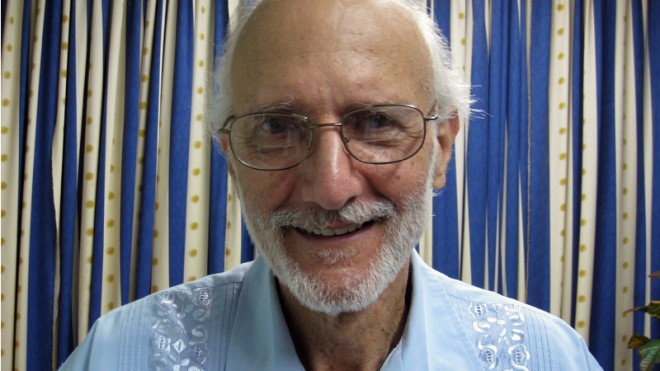American imprisoned in Cuba starts hunger strike

In this Nov. 27, 2012 file photo provided by James L. Berenthal, jailed American Alan Gross poses for a photo during a visit by Rabbi Elie Abadie and U.S. lawyer James L. Berenthal at Finlay military hospital as he serves a prison sentence in Havana, Cuba. The U.S. government masterminded the creation of a “Cuban Twitter” a communications network designed to undermine the communist government in Cuba, built with secret shell companies and financed through foreign banks, The Associated Press has learned. The project, dubbed “ZunZuneo,” slang for a Cuban hummingbird’s tweet, was publicly launched shortly after the 2009 arrest of Gross. He was imprisoned after traveling repeatedly to the country on a separate, clandestine USAID mission to expand Internet access using sensitive technology that only governments use. (AP Photo/James L. Berenthal, File)
• Has been in prison for four years for illegally setting up Internet access
• Protesting treatment by both Cuban and US governments
• Was a subcontractor for USAID at time of arrest
WASHINGTON — An American man who has been imprisoned in Cuba for more than four years after being caught illegally setting up Internet on the island is on a hunger strike, according to a statement released by his lawyer Tuesday.
Alan Gross, 64, said he began fasting to protest his treatment by the governments of both Cuba and the United States. He said he began fasting last Thursday.
Article continues after this advertisementGross was arrested in Cuba in 2009 while working quietly in the Communist-run country to set up Internet access for the island’s small Jewish community, access that bypassed local restrictions and monitoring. At the time, Gross was working as a subcontractor for the U.S. government’s U.S. Agency for International Development, which works to promote democracy on the island. Cuba considers USAID’s programs illegal attempts by the U.S. to undermine its government, and Gross was ultimately tried and sentenced to 15 years in prison.
Article continues after this advertisementCuban officials initially accused Gross of spying, though more recent statements have instead said he set up “illegal and covert communication systems” and was sentenced for breaking Cuban laws. His case has become a sticking point in improving ties between the two countries, which have not had formal diplomatic relations since 1961.
“I am fasting to object to mistruths, deceptions, and inaction by both governments, not only regarding their shared responsibility for my arbitrary detention, but also because of the lack of any reasonable or valid effort to resolve this shameful ordeal. Once again, I am calling on President Obama to get personally involved in ending this standoff so that I can return home to my wife and daughters,” Gross’ statement reads.
Gross’ hunger strike comes as U.S. and Cuban officials have questioned a different USAID program on the island. Last week, an Associated Press investigation revealed that USAID secretly created a “Cuban Twitter” communications network built to stir unrest on the island. The social media network, called ZunZuneo, was publicly launched shortly after Gross was arrested. It ultimately reached at least 40,000 subscribers before being shut down in 2012 when a government grant ended.
Gross’ lawyer, Scott Gilbert, said his client was aware of the story, which was published the same day he began fasting. It was one of the factors he took into account in beginning his hunger strike, Gilbert said.
“Once Alan was arrested, it is shocking that USAID would imperil his safety even further by running a covert operation in Cuba,” Gilbert wrote in a statement. “USAID has made one absurdly bad decision after another. Running this program is contrary to everything we have been told by high-level representatives of the Obama Administration about USAID’s activities in Cuba.”
USAID’s top official, Rajiv Shah, was scheduled to testify Tuesday morning before a Senate subcommittee. The topic is the agency’s budget, though the ZunZuneo program was expected to come up. Shah said after the AP story came out that the ZunZuneo program was not covert and that a study by the U.S.
Government Accountability Office into democracy promotion programs run by USAID and the State Department — including the Cuban Twitter project — found the programs to be consistent with the law.
Gross’ brief statement did not say whether he was drinking anything while on a hunger strike or mention his health. Lawyers said Gross has lost over 100 pounds (45 kilograms) while incarcerated.
His wife, Judy Gross, wrote Tuesday that she is “worried sick” about her husband’s health and that she doesn’t think “he can survive much more of this.”
RELATED STORIES
White House defends ‘Cuban Twitter’ to stir unrest